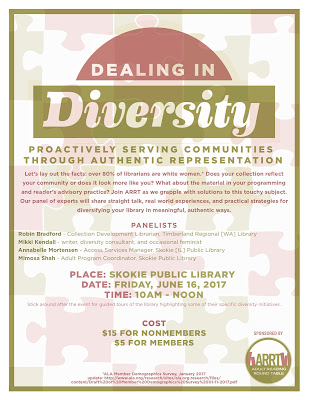On top of my article on helping horror readers in the May 1, 2017 issue of Library Journal, the April 15, 2017 issue saw the publication of my semiannual take over of Neal Wyatt’s Readers Shelf column. Every April 15th issue, she allows me to promote “Halfway to Halloween,” a holiday I am desperately trying to get to stick. For this issue, I can provide a list of suggested horror titles on any topic.
This year, I decided to highlight short stories. These six titles range from literary fiction to science fiction to straight out horror.
Click here for the column on the Library Journal site, or read it below.
******************************************************
Early Scares: Halfway to Halloween | The Reader’s Shelf
BY
Short stories are alive and kicking when it comes to tales of terror. Here are some recent anthologies that will deliver just the right amount of chills and thrills. From household names to fresh voices, from psychologically terrifying to blood and guts, there is something here for every future Halloween library display.
In the critically acclaimed A Natural History of Hell: Stories(Small Beer. 2016. ISBN 9781618731180. pap. $16; ebk. ISBN 9781618731197), Jeffrey Ford gathers 13 previously published stories into one collection that mixes fantasy and horror and shows his talent for distinctive sagas in which evil lurks just under the surface. Each installment relies on a dark and anxious mood with varying levels of speculative influence, outcast characters, and shocking conclusions. It opens with public exorcisms in the compelling and disquieting “The Blameless.” From there it ventures into vignettes as diverse as the “true” ghost story behind an Emily Dickinson poem and the sinister “Blood Drive,” in which every high school senior is required to carry a gun.
Richard Chizmar is the founder of Cemetery Dance Publications, working with the likes of Gillian Flynn, Justin Cronin, and Stephen King. The 35 stories in A Long December (Short, Scary Tales. 2016. ISBN 9781909640887. pap. $24.95; ebk. ISBN 9781596067943) offer a stand-alone volume of his own. Ranging from crime to dark fantasy to pure horror, the stories here all speak to a normal life turned upside down by terrible circumstances. The way Chizmar combines the dread and fear induced by his plots with a poignancy and kindness of tone makes them memorable. This is best showcased in the eponymous novella, where the protagonist is awoken one morning with the news that his best friend is a serial killer.
Laird Barron’s Swift to Chase (JournalStone. 2016. ISBN 9781945373053. pap. $18.95) perfectly encapsulates today’s literary genre-blend landscape. While terror is always at the center, cosmic horror, adventure, and even noir find their way into his writing. What sets Barron apart from the pack is how he crafts a wonderful sense of place—in this case, the beauty and menace of Alaska—and fills his settings with an oppressive atmosphere, great characters, original plots, and beautiful language. This anthology will play with readers’ minds in enjoyable ways, dragging them along for a satisfyingly scary ride and leaving them begging for more.
Editor Robert Silverberg gathers 21 works by a wide range of well-known authors, both living and dead, in This Way to the End Times: Classic Tales of the Apocalypse (Three Rooms. 2016. ISBN 9781941110478. pap. $19.95; ebk. ISBN 9781941110485). He further enhances the volume with a preface to each story, providing context on the time period in which it was written and how it may resonate with audiences today. See how writers such as Jules Verne and Connie Willis have embraced the apocalypse and used it to tell chillingly prescient narratives that reach across time and space. Silverberg reminds us that while the end of the world seems to be a hot trend today, it is actually only a blip in a long tradition of dystopian storytelling.
What the #@&% Is That? The Saga Anthology of the Monstrous and the Macabre (Saga: S. & S. 2016. ISBN 9781481434935. pap. $16.99; ebk. ISBN 9781481435000), edited by John Joseph Adams and Douglas Cohen, is among the best titles to focus on H.P. Lovecraft (1890–1937). Contributors were asked to write about a monster of their choosing, with only one rule: something must happen to make a character cry, “What the #@&% is that?” Accepting the challenge are 20 wordsmiths ranging from best-selling authors to up-and-comers, providing reading experiences from the utterly fearsome to the macabrely humorous. Playing along to see how the exclamation is employed gets more enjoyable the deeper one plunges into this Lovecraftian-inspired world.
The reigning sovereign of horror editing is Ellen Datlow, who is an acknowledged master of identifying and amassing the very best frights. Case in point is Nightmares: A New Decade of Modern Horror (Tachyon. 2016. ISBN 9781616962326. pap. $16.95; ebk. ISBN 9781616962333). Beginning where her essential Darkness: Two Decades of Modern Horror ends and spanning up to 2015, Datlow has compiled 24 of the finest stories written over the last ten years. By arranging them in chronological order, she illustrates the evolution and breadth of the genre, while spotlighting its brilliant new voices. Read this to see what you have been missing and to identify important titles to add to your collection before Halloween hits.


























